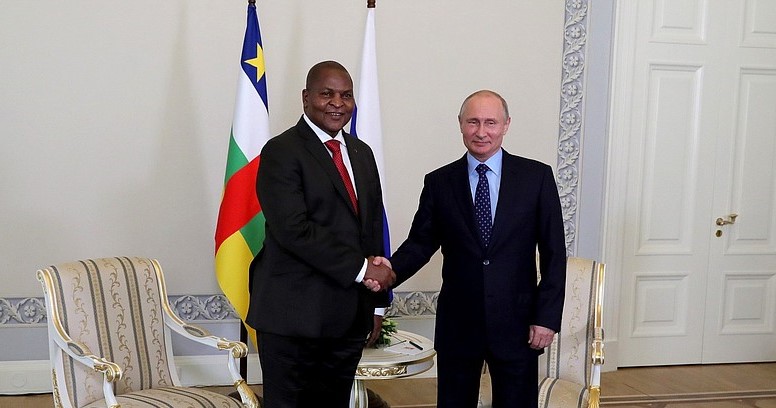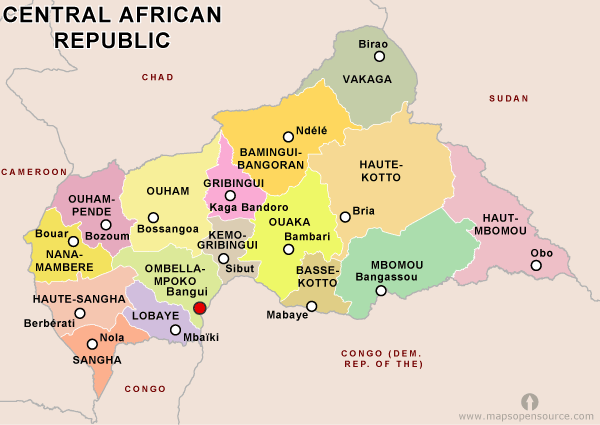Russia in Africa
August 22, 2018 | Expert Insights

Moscow signs a pact with the Central African Republic three weeks after Russian journalists were mysteriously murdered there.
Background
The Central African Republic, which got independence from France in 1960, has always been plagued by violence. The francophone country with 4.6 million people has been ravaged by conflict since its independence, having been governed by warlords, autocratic rulers and even a would-be monarchy.
Despite its significant mineral deposits and other resources, such as uranium reserves, crude oil, gold, diamonds, cobalt, lumber, and hydropower, as well as significant quantities of arable land, the Central African Republic is among the ten poorest countries in the world, with the lowest GDP per capita at purchasing power parity in the world as of 2017.
On 19th June 2017, the government of Central African Republic (CAR) signed a peace agreement in Rome with 13 of the 14 armed groups to end the ongoing violent conflict. However, violence has persisted. The current President Faustin-Archange Touadera has been unsuccessful taking control of the whole region.

Read more about our extensive analysis of CAR’s battle with armed rebel groups here
Analysis
Just three weeks after three Russian journalists were murdered while investigating the role of Russian mercenaries in the Central African Republic, Moscow and the turbulent African country signed an agreement on Tuesday to expand military cooperation.
Details of the agreement were not announced but it seemed to relate to Russian military trainers, 175 of whom are already present in the Central African Republic and who were the focus of a daring investigation last month by the Russian journalists.
All three, Orkhan Dzhemal, Aleksandr Rastorguev and Kirill Radchenko, died in mysterious circumstances on July 31 in what Russia and the Central African Republic insist was a roadside ambush by unidentified robbers near the town of Sibut.
Russia, which was deeply involved in Africa during the Cold War, when the East-West rivalry fuelled a series of proxy wars, largely retreated from the continent after the breakup of the Soviet Union.
Over the past year, however, it has shown a growing desire to return, forging close ties with the Central African Republic, Somalia and South Africa.
Russia’s renewed push into Africa may be attributed to a resurgent Russian military, which has been actively participating in the Syrian Civil on the behest of President Assad.
The dissolution of the Soviet Union and the following economic hardships ravaged the capacity of the Russian armed forces. However, under President Putin’s tutelage, Russia has forged a smaller but modern army, an effective air force and a capable, yet limited Navy.
The Central African Republic represents a potential military partnership for Russia as CAR is fighting a radical group of armed rebels.
Local warlords have targeted the United Nations Multidimensional Integrated Stabilization Mission in the Central African Republic (MINUSCA) which is tasked with disarming the various armed rebel groups in CAR.
Russian defence industry needs a foothold in Africa and the CAR’s continued struggle against rebel groups is a fertile market with the potential to grow.
More importantly, Africa has been largely dominated by Chinese and American investments over the past decade. Russia may be looking to extend its influence beyond Eastern Europe in a resource-rich country with a politically responsive administration.
As is a general modus operandi, the killing of the three Russian journalists may provide Russia with a precedent to entering into CAR legally.
However, this intervention may not necessarily be for war, but for strategic purposes.
Assessment
Our assessment is that Russia is seeking a strong presence in Africa to gain access to strategic resources more than natural resources. Russia has proved a point of being militarily capable of handling complex situations through their intervention in the Syrian Civil War. We feel that their involvement in CAR, through mutual agreement on, is a step for Russia in establishing a strategic presence in the African continent.








Comments